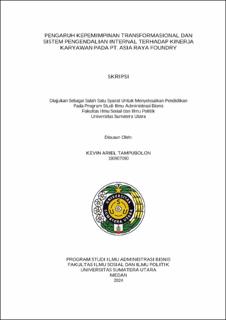Pengaruh Kepemimpinan Transformasional dan Sistem Pengendalian Internal terhadap Kinerja Karyawan pada PT. Asia Raya Foundry
The Effect of Transformasional Leadership and Internal Control System on Employee Performance at PT Asia Raya Foundry

Date
2024Author
Tampubolon, Kevin Ariel
Advisor(s)
Marpaung, Nicholas
Metadata
Show full item recordAbstract
Employee performance performance is a process or work produced by employees through several aspects that must be passed and has stages to achieve it and aims to improve the performance of employees themselves. Therefore, performance is an important element in the progress of an organization.
This study aims to analyze the influence of transformational leadership and internal control systems on employee performance at PT Asia Raya Foundry. The effect of transformational leadership and internal control systems will be tested partially and simultaneously on employee performance.
The research method used in this study is quantitative research method with associative approach. The population in this study were employees of PT Asia Raya Foundry totaling 40 people. Sampling was conducted through Purposive Sampling method using sampling techniques from Isaac and Michael formula as many as 38 respondents. The method of data collection used in this study is the primary data obtained by spreading questionnaires while secondary data obtained through the study of literature.
The results showed that transformational leadership variables and internal control systems significantly affect employee performance, transformational leadership variables and internal control systems affect jointly (simultaneously) on employee performance. the value of this coefficient shows the relationship between transformational leadership and internal control systems on employee performance is very strong with an R value of 0.946 or 94.6%. Adjusted R Square value is also known that transformational leadership variables and internal control systems can explain employee performance variables by 88.9%. while the remaining 11.1% were influenced by other variables not described in this study.
Collections
- Undergraduate Theses [1387]
